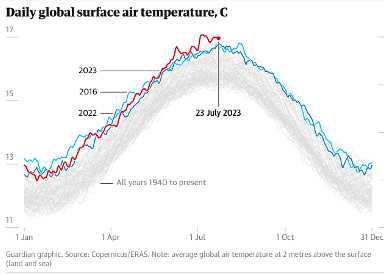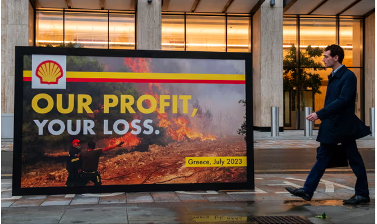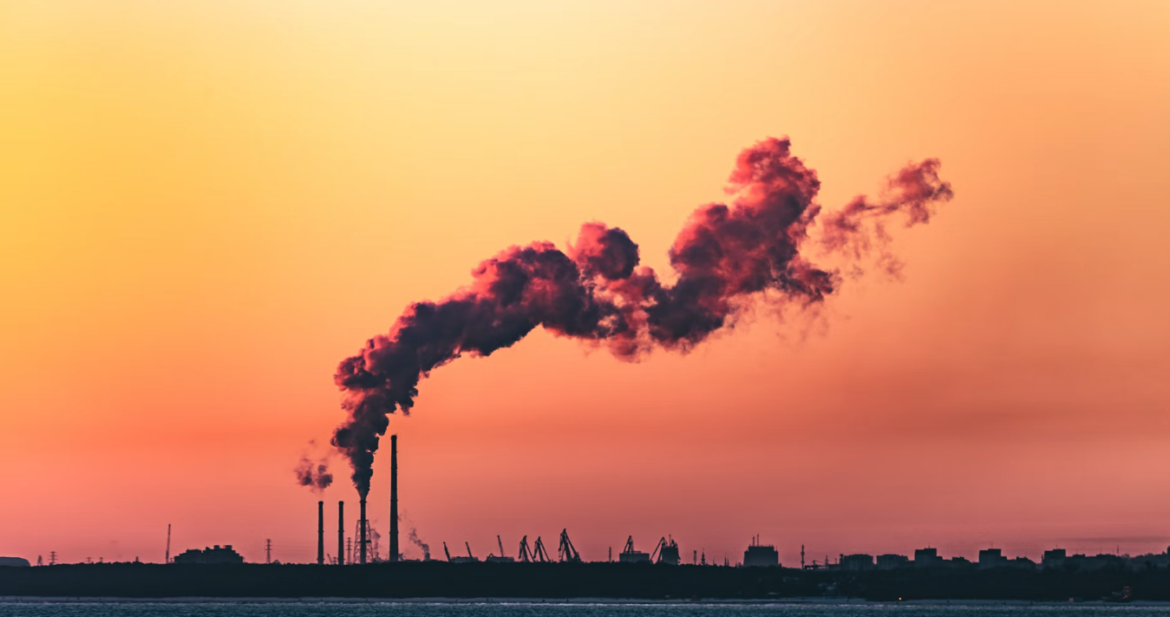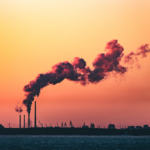Although the UK faced high temperatures at the start of summer and later towards the end of summer, the months in between – July and August – were relatively cool and rainy compared to previous years which saw highs of 40.3C on 19th July 2019. Meanwhile the rest of the world experienced extreme temperatures as July was the hottest month on record according to the EU’s Copernicus Earth Observation[1] programme (see graph below).

The UN Secretary General Antonio Guterres said in a statement: “The era of global boiling has arrived.”[2] The Northern Hemisphere, the US, Europe and China saw record temperatures:
- Phoenix reached highs of 110 degrees Fahrenheit (43.3C) for 31 consecutive days, topping the previously held record of highs of above 110 degrees F (43.3C) for 18 consecutive days back in 1974[3];
- Miami issued an excessive heat warning reaching highs of between 40-43C[4];
- In Italy, Rome set records with temperatures reaching 46C[5]; and
- Beijing has topped its record temperatures with 52C.[6]
Testimony to the hot temperatures, wildfires blazed across Europe – in France, in parts close to Nice international airport, in Portugal’s mountainous area of the Sintra-Cascais national park, which covers about 56 sq miles (145 sq km) west of Lisbon; in Croatia’s Dubrovnik region, a popular area for tourists in the Mediterranean and on Greece’s islands – forcing locals to evacuate their homes and tourists to abandon their holidays. Meanwhile in Northern Africa, Algeria’s northern Bouria region has been ravaged after wildfires spread through mountain ranges, killing at least 34 people.[7]
Wildfires wreak havoc on natural habitats and local biodiversity, as well as put locals at risk by exposing them to significant health risks. Wildfire smoke is packed with tiny pollutants – known as particulate matter – these pollutants can infiltrate the lungs and bloodstream if inhaled and can commonly cause difficulty breathing, as well as eye and throat irritation. It has also been linked to more serious long-term health issues such as lung cancer, according to the US Centers for Disease Control and Prevention[8].
Earlier in June a number of US states were put under air quality alert as smoke from Canadian wildfires in the Great Lakes region wafted all the way to New York. Americans were advised to stay indoors, with schools closing down, whilst some chose to brace the outdoors wearing COVID-19 masks to protect themselves. Meanwhile in the Southern hemisphere, a northern city in India, Noida city, has experienced flooding after excessive rains resulted in the Hindon river bursting its banks.
Freakish weather patterns – including high temperatures, as well as flooding – are undeniably a result of human-caused global heating. Experts claim that such weather events will not slow without sharp emission cuts. High temperatures not only have impacts on land, burning vast stretches of forests, obliterating a number of species, they also massively impact ocean life putting marine wildlife at risk, destroying kelp, seagrass and corals. Research in 2019 found that the number of ocean heatwave days had tripled in recent years.[9]
These extreme temperatures are occurring as energy and petroleum companies benefit from the war in Ukraine and associated energy crisis. For example, Shell made a major U-turn on its climate commitments, announcing in June that it would abandon plans to cut oil production each year for the rest of the year and keep its fossil production steady until 2030 – obviously igniting outrage among climate activists. Shell makes $5billion (£3.9) profit whilst fires rage on and people struggle to put food on their tables. Money that could easily be invested in the green transition is instead used to shower shareholders in dividends and buybacks.[10]

Image: Greenpeace UK activists hold a billboard outside Shell’s London headquarters after the company’s profits announcement on July 27th 2023.
This also coincided with UK Prime Minister Rishi Sunak announcing his policy to “max out” as he approved 100 new drilling licences in the North Sea for oil and gas which he claimed is “entirely consistent with our plan to get to net zero.”[11] This, while recently delaying plans to ban the sale of new petrol and diesel cars and vans from 2030 to 2035.[12] Oxfam’s climate policy adviser, Lyndsay Walsh, rightly responded to these decisions by asserting that: “Extracting more fossil fuel from the North Sea will send a wrecking ball through the UK’s climate commitments at a time when we should be investing in a just transition to a low-carbon economy and our own abundant renewables.”[13]
As a result of human activity, the planet is overheating and oceans are warming and thus, running out of oxygen. Humanity is facing widespread drought, unprecedented starvation and mass extinction driven by human activity. In response to these alarming pressures, we need urgent global action. Citizens need to play their part in creating systemic change and be the shakers through collective action. How? By taking small actions such as divesting from products/companies that do harm, lobbying and staying abreast of the latest science. Where possible we should support advocacy organisations to drive awareness and change. We should inspire those around us, to make the right decisions in support of our planet and our futures. Together, through collaboration and collective action we can turn the tide.
[1] Badshah, N. July was world’s hottest month on record, climate scientists confirm, The Guardianm Tuesday 8th August 2023: https://www.theguardian.com/environment/2023/aug/08/july-2023-worlds-hottest-month-climate-crisis-scientists-confirm
[2] UN News, Hottest July ever signals ‘era of global boiling has arrived’ says UN Chief, July 27th 2023: https://news.un.org/en/story/2023/07/1139162
[3] NBS News, Phoenix ends record 31-day streak of above 110-degree weather, August 1st 2023: https://www.nbcnews.com/news/us-news/phoenix-ends-record-31-day-streak-110-degree-weather-rcna97458
[4] CBS, Excessive heat warning declared for 3rd time for Miami Dade, Broward Country, July 23rd 2023: https://www.cbsnews.com/miami/news/excessive-heat-warning-declared-for-3rd-time-for-miami-dade-county/
[5] Outlook, Heatwave in Italy Intensifies, Rome Records 46C, July 19th 2023: https://www.outlookindia.com/international/heatwave-in-italy-intensifies-rome-records-46-c-photos-303967
[6] Reuters, China logs 52.2C Celsius as extreme weather rewrites history, July 17th 2023: https://www.reuters.com/world/china/china-logs-522-celsius-extreme-weather-rewrites-records-2023-07-17/
[7]https://www.theguardian.com/world/video/2023/jul/26/drone-footage-mountains-algeria-scorched-wildfires-video
[8] https://edition.cnn.com/2023/07/25/weather/canadian-wildfire-us-air-pollution/index.html
[9]https://www.theguardian.com/us-news/2023/jul/25/florida-ocean-temperatures-hot-tub-extreme-weather
[10] https://www.theguardian.com/business/2023/jul/27/shell-profits-oil-gas-price-shareholders
[11] https://www.theguardian.com/environment/2023/jul/31/dismay-as-rishi-sunak-vows-to-max-out-uk-fossil-fuel-reserves
[12] https://news.sky.com/story/rishi-sunak-confirms-hes-delaying-ban-on-new-petrol-and-diesel-cars-and-boosts-boiler-upgrade-scheme-12965656
[13] Ibid











